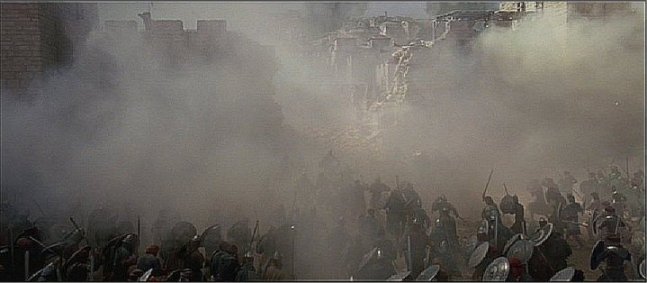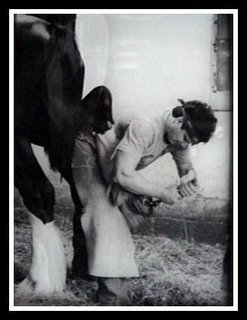Fraidy Cat Nation and the Nanny State
Linton Weeks, Washington Post Staff Writer has an artical revieling America's decent into a nation living in fear dubed Fraidy Cat Nation. The author claims that an overload of warnings of disaster from terrorism to global warming causes the brain to overwork its fear center.
The problem with this view goes to the heart of all liberal complaints, it's our chemistry not our intellect that is the source of the problem. Because of this approach the solution offered is :
The problem is not that we have a constant drumbeat of doom, which we do, but we have surrendered the initiative to deal with it to the government. Rather than saying "how am I going to solve this problem." The common response is "what are the authorities doing about this?" The situation in New Orleans leading up to and after Katrina is a prime example. The whole city seemed to be waiting around fro someone to tell them what to do. Citizens and government officials alike. There are plenty of smaller examples that reveal the mind set resulting from a liberal philosophy that places trust in government over personal initiative and responsibility.
About 10 years ago I was at a county board of supervisors meeting. The first item on the agenda was a group of children herded there by some adults to complain about their response of animal control to their call for help. One by one the children told their version of the event. All were filled with anxiety from waiting so long to have the county come and deal with the emergency. The problem? A raccoon had been hit by a car but was not killed instantly. They needed animal control to come and do something for the critter. Before the authorities arrived an hour later, it died of its injuries. While this pathetic scene unfolded I wondered, why didn't an adult send everyone home and dispatch the problem quickly with a bat or .22 rifle? The reason is that the adults were still children themselves, mental wards of the state.
My step son, having been taught to take reasonability for his own situation, suffered an attempted car jacking. The perpetrators were armed. They took his keys and told him to get into the car. As they turned to the vehicle he saw his chance, turned and ran to his front door. That's right it was right in front of his house. They shot at him but missed. He came back out as they were trying to drive away, firing his our weapon back at them. They panicked, wrecked the car and fled. Officer friendly gave my stepson a ticket for discharging a weapon in the city limits.
Y2K, remember that? In December of 1999 I was asked, "What have you done to prepare for Y2K?" I replied "I don't need to. I own guns." She thought for a minuet and said, "I never looked at it that way."
The reason a free libertarian society is more dynamic that a socialist command society is each individual making decisions for himself is more efficient that a central body assessing the problem and crafting a response. The response to Katrina is a good example. The residents a large number of whom had become dependent on the state for nearly every aspect of their lives, naturally waited for the state to tell them what to do, or come and do it for them. After the hurricane hit they were left for days without direction as the state tried to decide who and what were going to deal with each problem, of which they had limited or no information to go on. Even worse, the state began to disarm residents defending their property. The state felt order should be preserved by professionals in spite of their failure to have done so to that point.
The situation was further exasperated by the local officials also having a dependent relationship with the federal government. They twiddled their thumbs indecisively while expecting the fed to take up the slack and fill in the blanks. In a more vigorous society each individual would assess their plight, take a decision and act on it. The same would apply to the political leaders. Some would choose better than others, but in this case very few choose anything at all.
With all the chatter about another devastating event such as a natural disaster, epidemic or terrorist attack, we should be encouraging people to self reliance. Instead, we only ask what has the government done to prepare for the unknown.
I don't think it's the fear part of the brain that's overloaded. It's the thumb such part that's being overworked.
Basil's for beackfast
But the crucial area can only handle one emotion at a time. "The same amygdala that processes fear," Siegel explains, "also processes positive emotions. So if you are busy fueling your amygdala with fear, then courage, passion, laughter can't get in."
In other words, if the brain is always on a yellow (elevated alert) threat level, it is not able to rest or relax or even prepare properly for the next real onslaught.
The problem with this view goes to the heart of all liberal complaints, it's our chemistry not our intellect that is the source of the problem. Because of this approach the solution offered is :
Marc Siegel, a New York doctor and author of "False Alarm: The Truth About the Epidemic of Fear." He believes we need to redirect the nation's, and our own, response to danger warnings. "I'm not against preparation," he says, "I'm against alarmism."
The problem is not that we have a constant drumbeat of doom, which we do, but we have surrendered the initiative to deal with it to the government. Rather than saying "how am I going to solve this problem." The common response is "what are the authorities doing about this?" The situation in New Orleans leading up to and after Katrina is a prime example. The whole city seemed to be waiting around fro someone to tell them what to do. Citizens and government officials alike. There are plenty of smaller examples that reveal the mind set resulting from a liberal philosophy that places trust in government over personal initiative and responsibility.
About 10 years ago I was at a county board of supervisors meeting. The first item on the agenda was a group of children herded there by some adults to complain about their response of animal control to their call for help. One by one the children told their version of the event. All were filled with anxiety from waiting so long to have the county come and deal with the emergency. The problem? A raccoon had been hit by a car but was not killed instantly. They needed animal control to come and do something for the critter. Before the authorities arrived an hour later, it died of its injuries. While this pathetic scene unfolded I wondered, why didn't an adult send everyone home and dispatch the problem quickly with a bat or .22 rifle? The reason is that the adults were still children themselves, mental wards of the state.
My step son, having been taught to take reasonability for his own situation, suffered an attempted car jacking. The perpetrators were armed. They took his keys and told him to get into the car. As they turned to the vehicle he saw his chance, turned and ran to his front door. That's right it was right in front of his house. They shot at him but missed. He came back out as they were trying to drive away, firing his our weapon back at them. They panicked, wrecked the car and fled. Officer friendly gave my stepson a ticket for discharging a weapon in the city limits.
Y2K, remember that? In December of 1999 I was asked, "What have you done to prepare for Y2K?" I replied "I don't need to. I own guns." She thought for a minuet and said, "I never looked at it that way."
The reason a free libertarian society is more dynamic that a socialist command society is each individual making decisions for himself is more efficient that a central body assessing the problem and crafting a response. The response to Katrina is a good example. The residents a large number of whom had become dependent on the state for nearly every aspect of their lives, naturally waited for the state to tell them what to do, or come and do it for them. After the hurricane hit they were left for days without direction as the state tried to decide who and what were going to deal with each problem, of which they had limited or no information to go on. Even worse, the state began to disarm residents defending their property. The state felt order should be preserved by professionals in spite of their failure to have done so to that point.
The situation was further exasperated by the local officials also having a dependent relationship with the federal government. They twiddled their thumbs indecisively while expecting the fed to take up the slack and fill in the blanks. In a more vigorous society each individual would assess their plight, take a decision and act on it. The same would apply to the political leaders. Some would choose better than others, but in this case very few choose anything at all.
With all the chatter about another devastating event such as a natural disaster, epidemic or terrorist attack, we should be encouraging people to self reliance. Instead, we only ask what has the government done to prepare for the unknown.
I don't think it's the fear part of the brain that's overloaded. It's the thumb such part that's being overworked.
Basil's for beackfast








 BlogHop.com
BlogHop.com







0 Comments:
|Post a Comment
<< Home